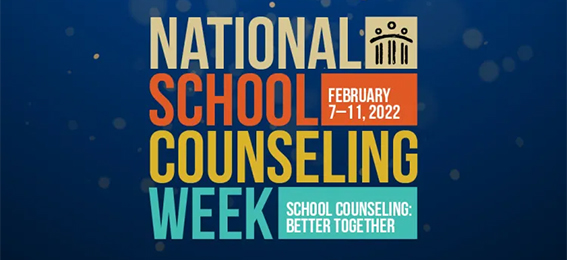| |
| |
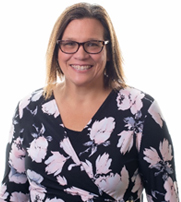 |
GUEST COLUMN: Learn more about REM grant opportunities
This month’s guest column is from Dr. Cari Kennedy, with TIE, who is helping to administer South Dakota’s Rethink K-12 Education Models (REM) grant, Re-Imagining Remote Education. Learn why she’s so excited for the opportunities this grant offers educators and, in turn, students.
The REM grant came about in 2020 when the COVID-19 pandemic forced schools to close and re-look at how educational models could evolve. In reality, we are really just looking for best practices to ensure that we are meeting the needs of today’s students. Why do I highlight today’s students? Well, it is because these students are the ones in our classroom now. What worked for students 10, 20, or 30 years ago might not work for today’s students. However, what I really invite you to think about is…what works for one might not work for another. We all know education is not, and should not be, a one-stop shop – so how can we work together to adjust the system? The REM grant focuses on several different pieces.
Quality Matters Teaching Online Certificate
The first piece is about best practices in the online world. If we have learned anything, it is that in-person education looks a lot different than online education. To address this, the REM grant established the Teaching Online Certificate (TOC) through Quality Matters. Quality Matters has an 11-week, mostly asynchronous course that focuses on best practices for teaching online. While the focus is mainly best practices for online learning, many of these practices can be applied in the classroom also - especially as educators become more and more well versed in blended learning. Tuition and books are paid for by the grant. Once complete, teachers receive a Quality Matters TOC and 45 continuing education contact hours. We will also have a Professional Learning Community set up upon completion so you can share your best practices with others who have taken the QM TOC. If you are interested in starting this program, click here [https://doe.sd.gov/grants/documents/REM-TOC-1121.pdf] for more information and for the link to apply. We can start cohorts pretty quickly. Educators can also email me [ckennedy@tie.net] directly to get set up in this program.
Competency-Based Professional Learning
Another piece of the REM grant is a professional learning opportunity for South Dakota teachers, administrators, and specialists. This program was developed by South Dakota teachers, administrators, and specialists who work with competency-based learning. There are seven courses worth nine credits that focus on competency-based learning methods. Participants will design lessons and units applicable to their classroom/school/district. There is a deep focus on incorporating choice, pathways, and learner agency in addition to assessment and whole child development. Embedded in the program, thanks to help from the Statewide Family Engagement Center, are methods to include families and communities as educators incorporate new practices with students. Courses run 6-8 weeks, and it takes about a year to complete. Nine graduate credits (through SDSU) and course books are paid for through the grant. Courses are asynchronous, but there are deadlines within each course.
Click here [https://doe.sd.gov/grants/documents/REM-PL-1121.pdf] for more information and the link to apply. Cohorts begin once 25 applications have been received.
Colloquium
The final piece of the REM grant is the colloquium. The colloquium is an opportunity for 30 (we currently have 14) schools to come together three times a year with a leadership team to learn about and plan to incorporate competency-based learning models. This is a powerful time of learning and planning where leadership teams determine what competency-based learning looks like in their school/district. Applications are now available for the second cohort. Click here [https://doe.sd.gov/grants/documents/colloquium-1121.pdf] for more information on the colloquium.
If you are interested in any part of the REM grant, please feel free to contact me at ckennedy@tie.net. I would be happy to answer any questions you may have! These are exciting opportunities for educators across our state.
|
|
| |
|
|
|
HOT TOPICS
|
Review proposed changes to accountability for school year 2021-22
The Department of Education is seeking public comment on an addendum to its 2021-22 State Plan required under the Elementary and Secondary Education Act, as revised by the Every Student Succeeds Act. Recognizing COVID-19’s continued impact on schools in school year 2021-22, and particularly the challenges around securing valid and reliable data, the department plans to submit changes to its State Plan relating to accountability and school improvement. If approved by the U.S. Department of Education, the changes would impact accountability for the current school year (Report Card issued fall 2022). View the addendum [https://doe.sd.gov/essa/] with proposed changes. Public comments can be emailed to DOE.Accountability@state.sd.us or mail them to: Department of Education, Attn: Matt Gill, 800 Governors Drive, Pierre, SD 57501. Public comment will be accepted until March 4, 2022.
Summary of proposed changes:
- Shift long-term goals forward by two years (goals for Academic Achievement, Graduation Rate, and English Learner Progress)
- Use only one year (SY 2021-22) of assessment data, rather than the typical three years, to calculate the Academic Achievement indicator
- Not report School Performance Index Scores publicly; however, the state would report those scores privately to school districts and identify schools for improvement based on those scores (list of Schools in Improvement would be public, just not scores)
|
|
Just in time for CTE Month! Perkins data now available in the South Dakota Report Card
Career and technical education data is now more accessible than ever. Perkins V has placed an emphasis on highlighting CTE success and opportunities for continued growth while making data-driven decisions. In an effort to improve access to CTE data, the Department of Education has invested significant time and resources into a new Perkins Annual Report Card (Perkins-ARC).
The Perkins-ARC showcases data by career cluster, student population groups, and demographic information. The public now has access to CTE performance data alongside existing district accountability information found in the South Dakota Report Card [https://sdschools.sd.gov/#/home]. The Perkins-ARC also includes secured access for district CTE leaders to take a deeper look into their CTE performance including student-level rosters and unsuppressed data.
|
|
DANR accepting applications to increase access to local foods at schools
The South Dakota Department of Agriculture and Natural Resources (DANR) is pleased to announce $80,000 in funding to help school districts use more local and fresh foods.
“I’m excited this funding is available to help our schools partner with farmers and ranchers across South Dakota,” said DANR Secretary Hunter Roberts. “This program will give schools the funding they need to buy new equipment, source more local foods, and teach our children about where their food comes from.”
DANR is partnering with Dakota Rural Action and South Dakota State University Extension to manage and promote the program.
The Farm to School Grant Program will offer grants up to $5,000 for each school district that applies. School districts must participate in the USDA National School Lunch Program to be eligible. The program will reimburse schools for cafeteria equipment, gardening supplies, and other items to increase the use of local foods. All school districts are welcome to apply.
Applications are due May 1, with awards expected to be announced by the end of the summer. For more information and to apply, please visit DANR’s Farm to School Grant webpage [https://danr.sd.gov/AboutDANR/farmtoschool.aspx].
USDA’s Food and Nutrition Service provided funding for this program.
|
|
|
|
| |
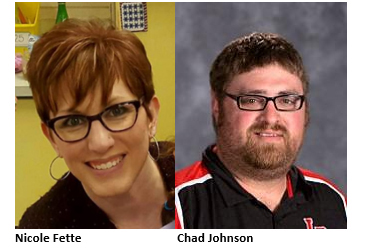
‘What are you waiting for?’ Learn about launching a JAG program
When asked what she would say to a school considering implementing the Jobs for America’s Graduates (JAG) program, new JAG-SD specialist Nicole Fette, Roosevelt High School, had five words: “What are you waiting for?”
The Jobs for America’s Graduates program seeks to connect with students who have barriers to success and empower them to graduate from high school and move confidently toward the realization of their dreams. JAG-SD is a program supervised by the South Dakota Department of Education and is a proven program that supports students to stay in school through graduation. Jobs for America's Graduates (JAG) is a state-based national nonprofit organization dedicated to supporting young people of great promise.
We reached out to two schools that launched programs in fall 2021 to find out how their first year is going. In the 2021-22 school year, Lyman High School, Oelrichs High School, and Roosevelt High School (Sioux Falls) joined the JAG-SD family. They join existing programs at Andes Central Middle and High School, Bennett County High School, Todd County High School, and Wagner Middle and High School.
Fette is the department chair of the alternative learning department at Roosevelt. Her father was the school counselor for many years in Wagner, where the JAG program is well-established, and she knows one of the district’s JAG specialists Renee VanDerWerff. The program’s success piqued her interest, and she is grateful for the opportunity to start implementing it now at her own school.
Chad Johnson is Lyman High School’s JAG specialist. Previously, he was the middle school language arts teacher. He is also the head wrestling coach and a bus driver for the district.
"When the district advertised the JAG specialist position, I had no idea what the program was, but upon doing some research, I felt like it was a bit of a calling,” Johnson said. “I've always felt it was important to get students active and involved in communities, and this program felt like the vehicle to do it, to make them better citizens, better leaders, and understand possible career paths. We've covered a variety of topics, including career development, employability, investing, financial literacy, car buying, community service through our Career Association, and project-based learning. It was a little bit of a leap of faith to leave 17 years of classroom stability to move into a new position. We’re still figuring out what we are, what we are not, and how to make the best experience for our students."
Johnson and Fette both dove right in by taking some of their JAG students to the Leadership Development Conference at Western Dakota Tech in October. Activities included a campus tour, teambuilding, breakout sessions, leadership training, and getting to know students from all the other JAG-SD schools.
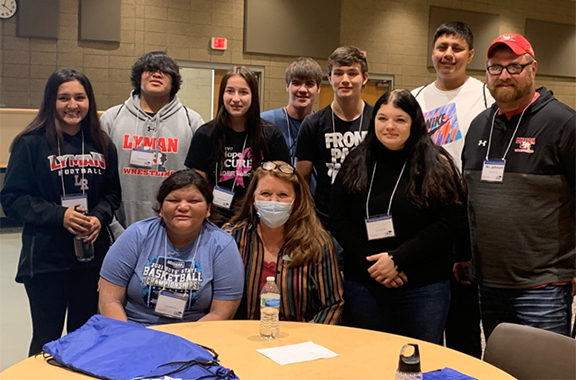
Chad Johnson and Lyman JAG students at Western Dakota Tech for the 2021 Leadership Development Conference
JAG is a class taught in high schools and middle schools by a JAG specialist, who is an employee of the school district. The credit class can satisfy an elective credit required for high school graduation. Students are empowered to take the lead on planning projects centered on civic responsibility, leadership, social interaction, academic performance, and professionalism.
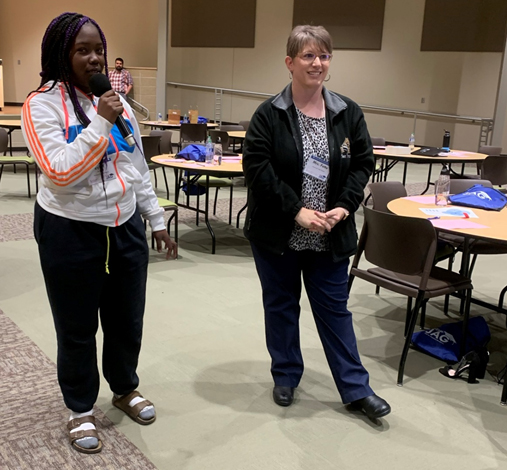
Nicole Fette (right) with one of her students at the 2021 Leadership Development Conference at Western Dakota Tech in Rapid City
In Lyman, Johnson’s students have been involved in community service projects and learning about community organizations like the Presho Area Chamber of Commerce and the Kennebec Town and Country Club.
Fette and Johnson have both brought in a number of professionals to talk with students about different kinds of careers. And through a special grant from AT&T, Dakota State University students are visiting JAG schools to offer interactive programming on cybersecurity issues.
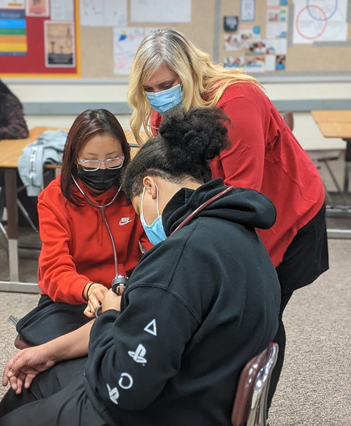
Former Roosevelt teacher Allison Hutchinson now works for Sanford Health and presented to Fette’s students about various aspects of the healthcare field and caring for one's personal health
“Sometimes at the beginning, especially, I felt like, gosh, it would really be nice if someone just gave me a binder and said, ‘Here do this,’” Fette said. “But doing this is very different for a school in Presho compared to a school like Roosevelt. They have opportunities that don't exist here. And we have opportunities that don't exist there. So it needs to be personalized.”
JAG students collectively decide how projects, class assignments, and community engagement activities are carried out by electing a governing body, assigning leadership roles, then holding each other accountable.
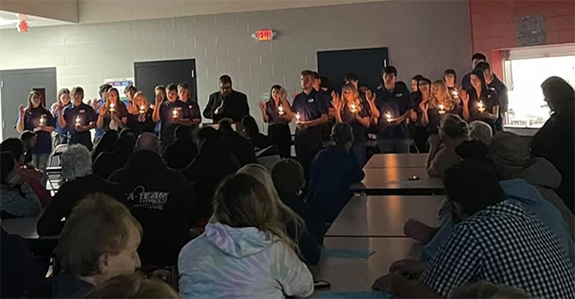
Lyman’s JAG induction ceremony, fall 2021
JAG students across the state are participating in a new yearlong project called Capitol Conversations, through which they engage with a variety of leaders to learn about the role of building relationships to help create change. In January, JAG students visited the Capitol to learn more about the legislative process. They spoke with the Governor, legislators, Department of Education leadership, and representatives of the South Dakota Retailers Association and Associated School Boards of South Dakota. Students have also invited local legislators into their schools.
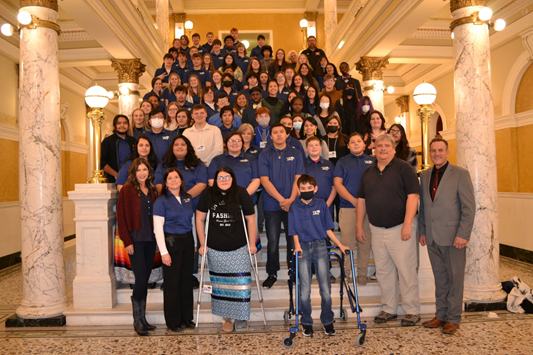
JAG-SD students visit the Capitol during the 2022 legislative session
At the annual statewide Career Development Conference held each spring, students have the opportunity to compete in public speaking, employability skills, financial literacy, and project-based learning events through which they can qualify to compete at the National Career Development Conference.
Fette and Johnson both look forward to the program evolving at their schools as new students come into the program and current students continue.
After JAG students leave high school, JAG specialists maintain regular contact with them for a year to help ensure they successfully pursue postsecondary and career goals.
“There's more to life than having a job,” Fette said. “You should have a passion and a career that is meaningful and fulfilling. And I find that in working with students who haven't always been believed in or haven't always had confidence or seen their worth. Being part of their journey to see that they have value is the most rewarding work I could probably ever do in my life.”
Learn more about JAG-SD and how to launch a program by visiting the JAG-SD webpage [https://doe.sd.gov/JAG-sd/].
|
|
|
| |
|
|
| |
Apply by March 1 to participate in CTE standards revision workgroups
Career and technical education (CTE) teachers, administrators, school counselors, postsecondary partners, and business/industry professionals are invited to apply by March 1 [https://www.surveymonkey.com/r/SDSTANDARDS22] to participate in the following content standards revision work groups this summer. Some work will also be required this spring. Questions? Email Amy Miller [amy.miller@state.sd.us].
- Business Management and Administration
- Hospitality and Tourism
- Marketing
- Transportation
- Capstone Courses
|
|
|
| |
|
|
| |
Make a difference in your community: Sponsor a Summer Food Service Program
The South Dakota Department of Education’s division of Child and Adult Nutrition Services is seeking local sponsors to assist with running a federally funded program that provides nutritious meals and snacks to children in low-income areas during the summer months.
Community organizations, nonprofits, schools, and tribal and local governments can apply to be sponsors if they operate in low-income areas, serve a group of mostly low-income children, or operate a summer camp with a high proportion of low-income participants. Parks and recreation departments, city and county health departments, libraries, and neighborhood service agencies can also participate as sites or sponsors.
Many South Dakota children receive free and reduced-price meals through the School Breakfast and National School Lunch Programs, but these programs are not available during the summer months, when school is not in session. To fill this gap, the U.S. Department of Agriculture provides federally funded meals through the Summer Food Service Program. This program provides free, nutritious summer meals to children at approved sites in areas with high concentrations of low-income children.
“We are looking for summer meal champions to make a real difference in children’s lives,” said Brigitta Bly, program specialist with South Dakota’s Child and Adult Nutrition Services. “Local organizations play a critical role in their communities because they have a clear understanding of the unique needs in their area.”
Organizations interested in reviewing sponsor responsibilities and that would like to serve meals during summer 2022 are invited to use the SFSP pre-screen tool at https://ican.sd.gov/ican/PreScreen/PreScreenOverview.aspx. Please complete this questionnaire by Feb. 23. Once eligibility is determined, department staff will contact sponsors with more information.
To learn more about serving as a sponsor or site, call Child and Adult Nutrition Services at 605-773-3413. For more information, go to https://fns-prod.azureedge.net/sites/default/files/resource-files/SFSP-Fact-Sheet.pdf.
The Summer Food Service Program is available at no charge for children ages 0-18 and to persons with disabilities over age 18, who participate in school programs for people who are mentally or physically disabled.
USDA Nondiscrimination Statement
In accordance with Federal civil rights law and U.S. Department of Agriculture (USDA) civil rights regulations and policies, the USDA, its Agencies, offices and employees, and institutions participating in or administering USDA programs are prohibited from discriminating based on race, color, national origin, sex, religious creed, disability, age, political beliefs or reprisal or retaliation for prior civil rights activity in any program or activity conducted or funded by USDA.
Persons with disabilities who require alternative means of communication for program information (e.g. Braille, large print, audiotape, American Sign Language, etc.), should contact the Agency (State or local) where they applied for benefits. Individuals who are deaf, hard of hearing, or have speech disabilities may contact USDA through the Federal Relay Service at 800-877-8339. Additionally, program information may be made available in languages other than English.
To file a program complaint of discrimination, complete the USDA Program Discrimination Complaint Form, (AD-3027) found online at https://www.usda.gov/sites/default/files/documents/USDA-OASCR%20P-Complaint-Form-0508-0002-508-11-28-17Fax2Mail.pdf and at any USDA office, or write a letter addressed to USDA and provide in the letter all of the information requested in the form. To request a copy of the complaint form, call 866-632-9992. Submit your completed form or letter to USDA by:
- mail: U.S. Department of Agriculture
Office of the Assistant Secretary for Civil Rights
1400 Independence Avenue, SW
Washington, D.C. 20250-9410
- fax: 202-690-7442; or
- email: program.intake@usda.gov.
This institution is an equal opportunity provider.
|
|
|
| |
|
|
| |
Become an SD-STARS Power User to create district-specific reports
STARS Analytics is a new reporting feature in SD-STARS available to SD-STARS Power Users. These individuals can use STARS Analytics data to create dossiers, or reports, which can then be published to users in a specific district via the new District Report menu in SD-STARS. SD-STARS is offering trainings this spring for those interested in becoming SD-STARS Power Users.
Who is a good candidate to be a Power User?
A Power User is an SD-STARS user who has elevated permission, receives training in STARS Analytics, and can create and publish district-created reports for users in their district. An individual is a good candidate to be a Power User if they:
- Can log in to SD-STARS
- Can be given elevated permission by their district to access confidential district-wide student data, including free and reduced lunch data, for the purpose of creating and publishing reports for users in the district. The district must sign an SD-STARS Power User access form acknowledging this elevated permission.
- Understand educational data, especially data reported to the state by districts, including: enrollment, student demographics, state assessments, special education data, and accountability report card
- Are comfortable manipulating data to form lists, tables, and charts. They can organize, compare, and analyze data by using filters, colors, etc.
There are some key expectations for Power Users, including attending training, communicating to the Department of Education and other Power Users, and more. For more information on STARS Analytics and the Power User permission, see this fact sheet [https://doe.sd.gov/pressroom/educationonline/2022/02/documents/PowerUser-FactSheet.pdf].
The SD-STARS team will train Power Users in three locations across South Dakota this spring. Districts with interested individuals are required to send teams of 2-3 participants to the training. These participants would learn about STARS Analytics and become Power Users.
Training dates and locations:
- March 29-30, Sioux Falls [https://southdakota.gosignmeup.com/public/Course/browse?courseid=13402]
- April 5-6, Pierre [https://southdakota.gosignmeup.com/public/Course/browse?courseid=13403]
- April 12-13, Rapid City [https://southdakota.gosignmeup.com/public/Course/browse?courseid=13405]
- May 5, virtual follow-up meeting (included when registering for any of the above locations)
|
|
|
| |
|
|
| |
Submit presentation proposals by March 4 for SD MTSS Summer Education Conference
This year’s SD MTSS (Multi-tiered System of Supports) Conference will take place June 21-22, in Oacoma. Individuals and teams are encouraged to submit presentation proposals for breakout sessions on Day 1. One presenter for each selected breakout session will receive free conference admission. Submit proposals [https://forms.gle/d88Tn2jiVEyLFsBL8] by March 4. Presenters will be notified by March 18. Questions? Email Brandi Gerry [brandi.gerry@state.sd.us].
|
|
|
| |
|
|
| |
Nominate your District Teacher of the Year by March 1
South Dakota school districts have an opportunity to celebrate great teaching through the South Dakota Teacher of the Year, or TOY, program.
Each district that wishes to participate in the program needs to submit the name of its District Teacher of the Year to the South Dakota Department of Education, by March 1 in order for the nominee to be considered for the Regional Teacher of the Year program.
The department will contact District Teachers of the Year directly to apply for the regional award. Region applications are due March 31.
The state is divided into five regions, and one winner will be chosen from each. One of these five regional finalists will become South Dakota’s 2023 Teacher of the Year, to be announced in October. That person represents the state in the national competition in spring 2023.
Districts may determine their own methods for selecting district winners, but nomination forms should be made available to teachers, parents, students, school support professionals, and the general public through multiple avenues and formats.
Find more information, including a map of the five regions and a sample nomination form on the South Dakota Teacher of the Year webpage [http://doe.sd.gov/oatq/teacheroftheyear.aspx].
Professional development opportunity for Regional TOYs
The department will be able to offer the five Regional Teachers of the Year the opportunity to attend the 2022 National Teacher Leadership Conference hosted by the National Network of State Teachers of the Year, to be held as a hybrid-virtual event July 13-15.
For more information about the South Dakota Teacher of the Year selection process, including guidelines and timeline for selection, and regional and state applications, visit the South Dakota Teacher of the Year webpage [http://doe.sd.gov/oatq/teacheroftheyear.aspx].
Questions? Please contact Kelly Royer at 605-773-8415 with the South Dakota Department of Education.
|
|
|
| |
|
|
| |

Mentoring Summer Academy presentation proposals due March 18
The Department of Education is seeking proposals for breakout sessions at the 2022 Mentoring Summer Academy. More than 1,000 new teachers and mentors who are participating in the statewide mentoring program will attend this event scheduled for June 1-2 in Sioux Falls at the Denny Sanford Premier Center.
The purpose of the Mentoring Summer Academy is to provide a time of celebration, reflection, and professional development. Presenters will be reimbursed travel expenses and will receive $150 per session for their work.
Proposals are due by March 18. Find more information on the Proposal Application page [https://www.surveymonkey.com/r/82CSMD2].
|
|
|
| |
|
|
| |

State Historical Society looking for SD’s History Teacher of the Year
Nominations are being accepted until Feb. 21 for the 2022 South Dakota History Teacher of the Year, one of the Governor’s Awards for History, coordinated by the South Dakota State Historical Society. Nominees may be an elementary or secondary teacher of history or social studies in public or private schools in South Dakota. They must be teaching at least half time during a school year and have a minimum of three years teaching experience in history, social studies, or a related field.
Nomination forms can be found on the State Historical Society’s website [https://history.sd.gov/aboutus/eventsanded.aspx]. Each nominee will be sent an application packet which must be completed and returned for review by March 17. For more information, contact Jeff Mammenga, awards coordinator, at Jeff.Mammenga@state.sd.us or 605-773-6000.
The winner will be announced at this year’s State Historical Society History Conference, being held April 22-23 in Pierre.
|
|
|
| |
|
|
| |
 |
Upcoming Events
A complete listing of events is available at GoSignMeUp.
School Counselor Collaboration meetings
Feb. 14, 10-11 a.m. CT
[https://state-sd.zoom.us/meeting/register/tJEpf-ugrT4uEtFIijmRNLSV9N2ZHbeaS_tw]
March 2, 2-3 p.m. CT
[https://state-sd.zoom.us/meeting/register/tJ0vfuqupjMtHtTtP66U1HAClz2fWYeHk52M]
April 1, 10-11 a.m. CT
[https://state-sd.zoom.us/meeting/register/tJAoceCgrD8iH9yPxl8Q2E-QMU5wORtNCrL6]
How to Submit a Report Idea
or Enhancement to SD-STARS
Feb. 15, online
Title Programs Bimonthly Zoominars
Feb. 22, April 19, June 21
Attendance Trends and Student Performance
March 15, online
South Dakota Special Education Conference
March 15-16, Sioux Falls
[https://sdspd2022.eventbrite.com/]
SD-STARS Power User Training
March 29-30, Sioux Falls
April 5-6, Pierre
April 12-13, Rapid City
May 5, virtual follow-up meeting (included when registering for any of the above locations)
TIE Conference
April 4-5, Sioux Falls
[https://www.eventsquid.com/event.cfm?id=14226]
Board of Education Standards
April 7, Mitchell
[https://boardsandcommissions.sd.gov/Meetings.aspx?BoardID=32]
Active Shooter Workshop
April 12, Pierre
[https://sdoem.eventsmart.com/events/active-shooter-workshop-pierre-2/]
ExCITE! 2022 (formerly School Library Boot Camp)
July 2022, online
[https://sites.google.com/view/learnleadsdslschlib/courses/excite]
Top 20 Training
July 21-22, Oacoma
[https://doe.sd.gov/pressroom/educationonline/2022/02/documents/Top20Training-0122.pdf]
|
|
|
| |
|
|
| |
|
|
|


